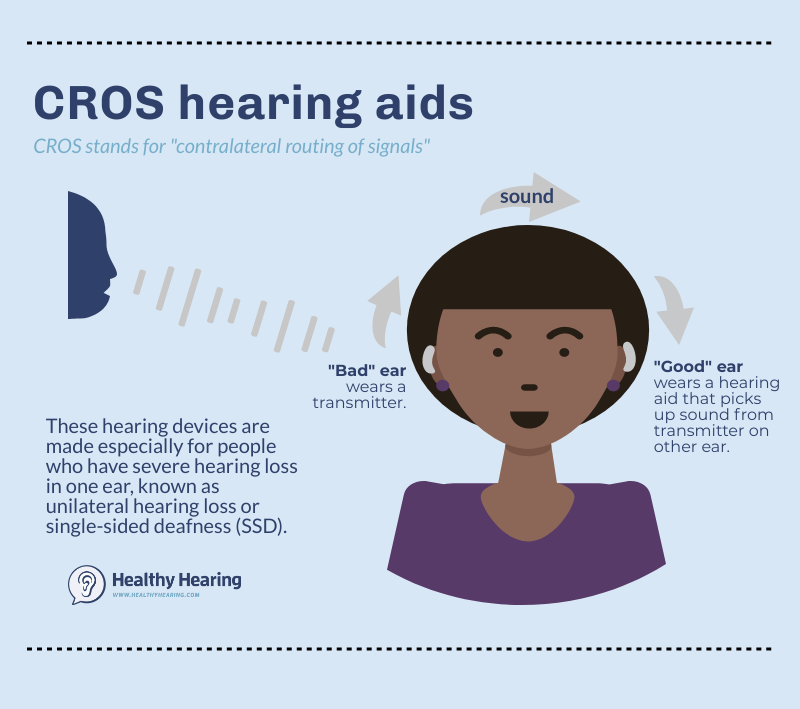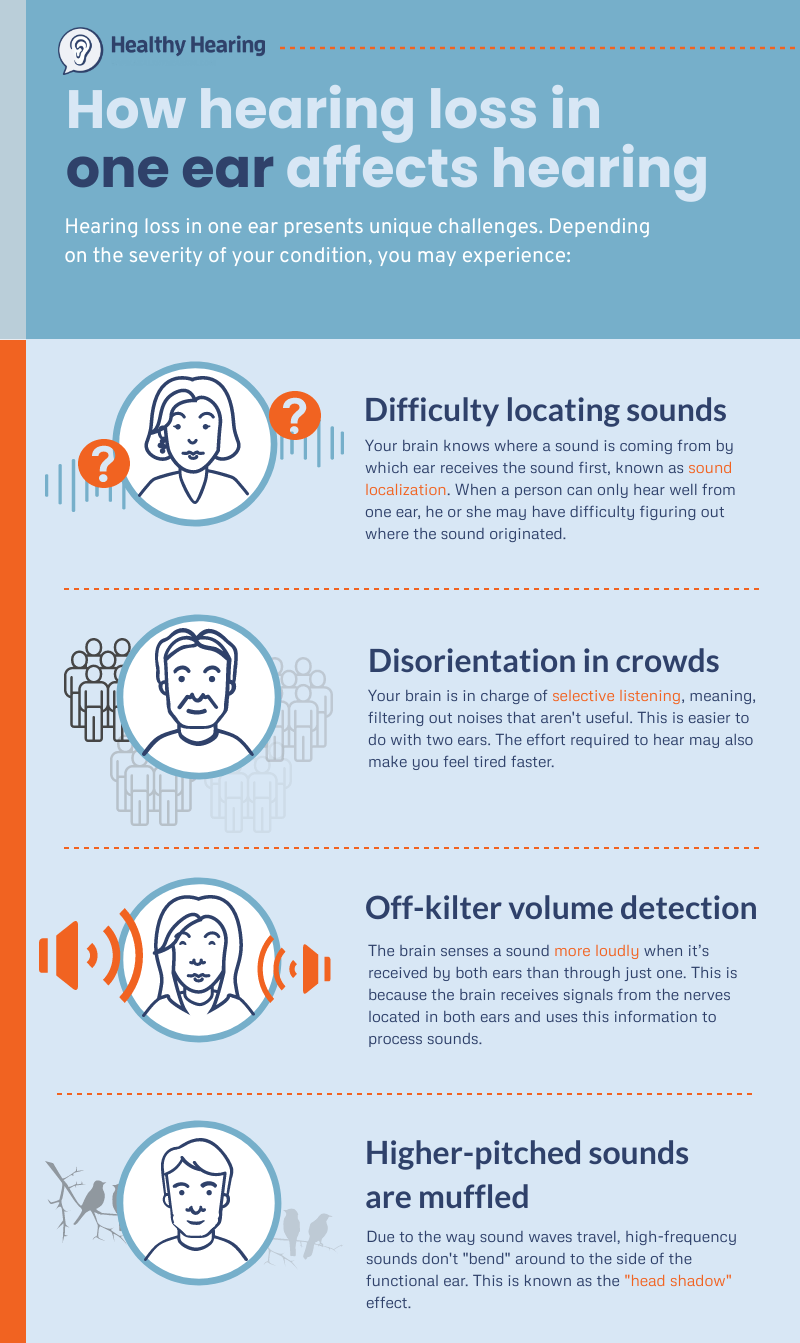|
www.HealthyHearing.com |
Hearing loss in one earAlso known as unilateral hearing loss, this condition creates unique hearing challenges
Contributed by Joy Victory, managing editor, Healthy Hearing Key points:
Most people with hearing loss have what's known as "binaural" hearing loss, meaning both ears are affected. But some people only experience hearing loss in one ear. This is known as unilateral hearing loss or single-sided deafness, depending on the severity of the hearing loss. It's generally referred to as "single-sided deafness" (SSD) when the degree of hearing loss is profound or near-profound. Let's take a closer look at symptoms of hearing loss in one ear, why it happens, and what your treatment options are.
What are the signs of unilateral hearing loss?We were designed to have two ears for a reason—the brain uses both ears to locate where sound is coming from and to hear more clearly. Having diminished or no hearing in one ear can present unique challenges that can be more pronounced the more severe the hearing loss is. Hearing loss in one ear may mean:
What is the 'head shadow effect'?If you have single-sided deafness, you will likely experience something known as the "head shadow" effect. Due to the way sound waves travel, high-frequency sounds don't "bend" around to the side of the functional ear, meaning a person who can only hear in one ear never hears them. "The head essentially acts as a shield, blocking sounds from the poorer hearing ear from reaching the better hearing ear," explained Cleveland Clinic audiologist Sarah Sydlowski. The end result is that speech can sound muffled, because a person can't hear high-frequency sounds like "s" or "f." Can single-sided deafness cause tinnitus?Yes. Patients with hearing loss in one ear, and specifically those with single-sided deafness, commonly experience tinnitus in one ear. Research indicates that anywhere between 54-84% of those with SSD "may have debilitating tinnitus in the deaf ear." This occurs frequently because the brain receives little to no sound input from the affected ear and may generate “phantom” sounds in response. Tinnitus is also commonly associated with hearing loss in general, so people with mild to moderate hearing loss in one ear may experience ringing or buzzing as well. However, it is typically less severe than in those with SSD. Causes of hearing loss in one earThere are a number of potential causes of hearing loss in just one ear, including but not limited to:
Sometimes a cause can't be identified, or is due to a combination of factors. Can hearing loss in one ear go away?Depending on the cause, hearing loss in a single ear can sometimes be temporary. Common reversible causes include earwax blockages, middle-ear fluid from an infection, or sudden pressure changes (like when flying). Identifying and treating the cause quickly usually restores your hearing back to normal. Sudden hearing loss in one earHearing loss in one ear can develop quickly, and when it does it's known as sudden sensorineural hearing loss (SSHL). It’s important to act fast if you or a loved one notice any change. You might also experience “double hearing,” known as diplacusis, as the loss develops.
The sooner you seek treatment, the better your chances of a full recovery. Steroid treatment, when started early, can often restore at least some hearing. Another option is hyperbaric oxygen therapy. Treatment options for single-sided hearing lossTreatment options for mild to moderate unilateral hearing loss will be different than those for severe hearing loss or single-sided deafness. Thankfully, there are multiple options depending on the results of your hearing test.
 It's important for patients to realize these devices re-route sound, but do not "restore" hearing to the deaf ear, according to Erika Woodson, MD, Medical Director of Cleveland Clinic’s Hearing Implant Program, in an online discussion with patients about the devices. "You will not hear in stereo. The benefits of these hearing strategies are to improve awareness of sound from 360 degrees, but you will not be able to localize sound." Learn more: What are CROS and BiCROS hearing aids? Other treatment options
bone-anchored hearing aid. Image courtesy Oticon Medical
Finding a hearing specialistIf you notice hearing loss in one ear, the first step is to get a thorough evaluation. For mild to moderate loss, a qualified audiologist can help find the right hearing aid. If you’re in need of treatment for SSD, and want information on CROS devices, bone-anchored systems, or cochlear implants, look for an audiologist or ENT who specializes in single-sided deafness. You can check out our provider directory to find a trusted professional near you and take the next step toward better hearing. Joy Victory, managing editor, Healthy Hearing
|
Featured clinics near me
Earzlink Hearing Care - Reynoldsburg
7668 Slate Ridge Blvd
Reynoldsburg, OH 43068

Find a clinic
We have more hearing clinic reviews than any other site!



 Joy Victory has extensive experience editing consumer health information. Her training in particular has focused on how to best communicate evidence-based medical guidelines and clinical trial results to the public. She strives to make health content accurate, accessible and engaging to the public.
Joy Victory has extensive experience editing consumer health information. Her training in particular has focused on how to best communicate evidence-based medical guidelines and clinical trial results to the public. She strives to make health content accurate, accessible and engaging to the public.